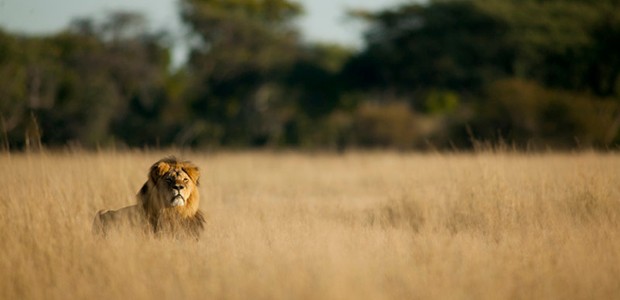The Cecil effect: 'It can be disastrous for an ecosystem'

It’s called the “Cecil effect” and it complicates the moral conversation around big-game hunting in Africa.
When Cecil the lion was killed for sport in Zimbabwe last July by American dentist Walter Palmer, there was a global outcry — after all, Cecil was part of a research program funded by the University of Oxford in England.
The Cecil effect, unpacked
This outrage over Cecil's death sparked a backlash against legal big-game hunting safaris.
A subsequent fallout of the affair — the so-called "Cecil effect" — has been a drop in legal trophy hunting and an overpopulation of lions in Zimbabwe. The Bubye Valley Conservancy, the country's largest wildlife area, may have to cull as many as 200 of the large cats as the cost to relocate even one is prohibitive.
“People are very sensitive about Cecil’s death, which was tragic, but it’s not so simple,” says Robert B. Weladji, an associate professor in Concordia’s Department of Biology and associate researcher with the Zoo de Granby.
As an ecologist concerned with conservation, Weladji must consider how the Cecil effect will impact the ecosystem.
“If you let the higher trophic level of the food chain — top predators like lions — grow uncontrolled in population, that has a serious effect on the lower trophic levels, the herbivores,” explains Weladji.
“It can be disastrous in terms of ecosystem functioning. Lions give birth to up to four cubs and have a shorter gestation length, so they reproduce at a faster rate than most herbivores of their size, and they don’t have natural predators. That’s why legal hunting is not always killing for killing’s sake. It’s one way to manage the ecosystem, in this case the Bubye Valley Conservancy.”
A tourism draught
For a relatively poor country like Zimbabwe, Weladji adds, the economic consequences are equally extreme.
CNBC reported that in 2013, the safari and big-game hunting sector accounted for more than 10 per cent of the country's GDP, with a direct contribution of $71 billion, nearly double the global average on a percentage basis.
Zimbabwe’s tourism professionals sounded the alarm bell as early as July 30, 2015, just a month after Cecil’s death.
"Our tourism sector, which was booming, has recorded a significant drop in arrivals in the Hwange National Park, where Cecil was being kept,” Zimbabwe Tourism Authority Chief Executive Karikoga Kaseke told USA Today, without giving exact figures.
“The culprits have painted Zimbabwe with a dirty brush. We are now seen as people who do not promote and protect animal rights.”
Weladji is sympathetic to Kaseke and Zimbabwe’s current public relations nightmare, saying that it's important to consider how the hunting revenue was being managed.
“Ask yourself, ‘Was part of the income from wildlife safaris being reinvested in conservation?’” says Weladji, who cites a February 2016 study in Trends in Ecology & Evolution to that effect.
“If the money dries up, how will they hire park game wardens, buy cars for anti-poaching units and pay for animal tracking? The whole conservation effort is jeopardized. That’s where the disaster occurs.”
But there’s another negative consequence of lion overpopulation that most coverage of the Cecil effect hasn't mentioned.
“More people and livestock will be killed by lions,” says Weladji. “That’s what happens when there’s no easy access to prey.
“Local people living near protected areas, as well as their livestock, are easy prey. You can’t let the top predators increase, unchecked, without decimating the herbivores and causing a dysfunctional ecosystem.”
Read about Concordia professor Robert B. Weladji's research at the Zoo de Granby.


